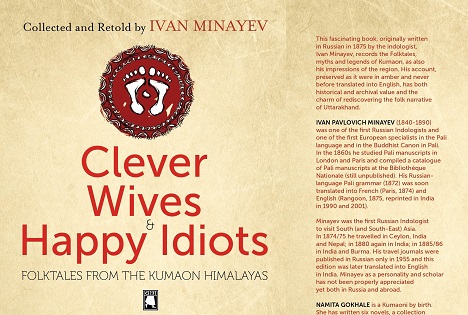
Imagine a Russian scholar so enamoured of India and Buddhism that he travelled to the country, talked to ordinary people and wrote down their stories, almost one hundred and fifty years ago.
Ivan Minayev did all those things, and wrote his impressions of those journeys.
Ivan Pavlovich Minayev was among the earliest Russian Orientalists and Philologists, and the first Russian Indologist to visit South (and South-East) Asia. One of Europe’s first specialists in the Pali language and in Buddhist history in Pali, Minayev developed this interest as a student of Professor Vasily Vasiliev at the University of Saint Petersburg. He travelled abroad to prepare a catalogue of Pali manuscripts at the British Museum in London and Paris and compiled a catalogue of Pali manuscripts (which are still unpublished) at the Bibliothèque Nationale in Paris in the 1860s.
A member of the Russian Geographical Society, he first travelled to India, Ceylon, Nepal and Burma in 1874—75. His life-long interest in the history of Buddhism saw him visit India again, twice, in 1880 and 1885—86. Minayev's magnum opus, ‘Buddhism: Untersuchungen und Materialien’, was printed in 1887. He was among the first European scholars to feel that the study of Buddhism and Pali was vital for the proper understanding of ancient Indian history and society.
It was during his first visit that he visited the Kumaon region of the Himalayan foothills, where the river Ganga originates, around which are wrapped many of the epic legends of India. It was during his first visit, searching for legends about the founder of Buddhism, Siddharta Gautama (who became the ‘Buddha’) that he recorded folk tales and legends of the people of the Kumaon region, which form the subject of the collection of stories, ‘Clever Wives and Happy Idiots.’
Translated into English by two eminent authors, Bulbul Sharma and Madhu Malik, both very well versed with the Kumaon region, the book ‘Clever Wives and Happy Idiots’ is being released in New Delhi on Monday (5th October).
Minayev was born on October 21, 1840, into the family of a modest clerk of the Tambov region. Hard work and the kindling of an extreme interest in Buddhism under inspiring teachers saw him emerge as one of the foremost eastern scholars of the era, with disciples including Serge Oldenburg, Fyodor (F. Th) Stcherbatsky and Dmitry Kudryavsky. A multi-faceted personality, Minayev was founder of the study of southern Buddhism, author of the best Pali grammar of that time (translated into many European languages), a historian who wrote the book ‘Ancient India’ (about India in the 15th century, during the time of Afanasy Nikitin), an expert in historical geography (works on the Middle East, a translation of a book by Marco Polo), a traveller who studied and collected ancient materials on India, Ceylon and Burma, and a folklorist, who left, among other things, this very interesting collection of folk tales and legends of Kumaon (in today’s Uttarakhand state).
It was only in Kumaon that Minayev systematically and painstakingly recorded local folklore. During his brief travels, he wrote about fifty stories, more than twenty legends, and several folk songs in the local Pahari (mountain) language. These records became the basis for a comprehensive book and several articles, published both during the author’s lifetime and posthumously.
This fascinating collection of stories, originally written in Russian in 1875, records the folktales, myths and legends of Kumaon, as also Minayev’s impressions of the region. His account, preserved as it were in amber, and never before translated into English, has both historical and archival value and the charm of rediscovering the folk narrative of Kumaon.
“These folk tales, recorded in 1875 by the great Indologist, Ivan Minayev, have both literary and academic value. These are stories of the earth and they speak to many generations. In their seeming simplicity there is a great wisdom,” said Dr Kapila Vatsyayan, leading Indian classical art scholar and historian.
"Ivan P. Minayev’s collection is eclectic and unique, the kind of tales and anecdotes that are told around a campfire along the side of a mountain trail. Despite being translated from Kumaoni and Hindustani into Russian and then into English, they are as fresh and amusing today as they must have been in 1875." Stephen Alter, author of Becoming a Mountain.
Published by ‘Yatra’ Books, with support from the Mikhail Prokhorov Fund, Moscow, ‘Clever Wives and Happy Idiots’ is a lively set of anecdotal stories about husbands and wives, dim witted sons and smart mothers, princes and ordinary folks, who could be anywhere.
Minayev, a contemporary of but less well known than the older German philologist and orientalist Max Mueller, died in 1890and has yet to be properly appreciated for being such a diverse and rich personality and phenomenal scholar either in India or in Russia and abroad.
Clever Wives and Happy Idiots: Folktales from the Kumaon Himalayas, Collected and Retold by Ivan Minayev, with a foreword by Namita Gokhale; Yatra Books, 2015.
Translated by: Bulbul Sharma and Madhu Malik (Bulbul Sharma is a widely translated writer and painter and a founder-member of Sannidhi, an NGO that works in village schools.
Professor Madhu Malik has a degree in Slavic Folklore and worked as Professor of Russian Language and Literature at Bucknell University in Pennsylvania for 25 years. She is now working on the translation of contemporary Russian fiction.).
Russian Editor: Sergei Serebriany (Director of E.M. Meletinsky Institute for Advanced Studies in the Humanities, Russian State University for the Humanities Moscow).
Yatra Books, a multi-lingual publishing company, was founded by Namita Gokhale and Neeta Gupta in January 2005. The name ‘Yatra’ stands for cross-cultural literary journeys, including translation. Yatra has key collaborations with international institutions like the Mikhail Prokhorov Fund, which provides support for translation of Minayev's work into English.
Published with support from the Mikhail Prokhorov Fund, Moscow.
All rights reserved by Rossiyskaya Gazeta.
Subscribe
to our newsletter!
Get the week's best stories straight to your inbox